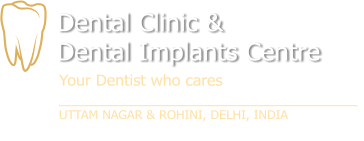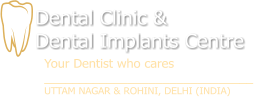


Dental Clinic & Dental Implants Centre
| Uttam Nagar & Rohini | Delhi, India | Mobile: +91 9810850226 | email: tooth.pandit@gmail.com
Foreign Dentist : Foreign Dentistry?
Choosing
to
get
dental
work
done
away
from
home
can
be
quite
a
tricky
affair.
While
choosing
a
dentist
in
New
Delhi,
India,
the
following
might
serve
as
a
guideline
to
verify
if
you
are
in
safe
hands :
THE GET ACQUAINTED APPOINTMENT
1)
Have
your
first
appointment
as
a
getting
acquainted
visit.
Have
a
chat,
discuss
your
problems
and
observe
the
dentist,
the
clinic
and
the
staff
to
see
whether
your
expectations,
personalities
and
health
care
philosophies
match.
Once
a
level
of
confidence
and
trust is achieved, proceed further.
QUALIFICATION MATTERS
2)
Dentistry
is
a
licensed
profession.
Please
verify
that
your
dentist
holds
license
in
the
form
of
a
registration
number
from
the
Delhi
Dental Council or any other Indian State Dental Council.
3)
Verify
that
your
dentist
holds
as
a
minimum,
a
Bachelor
of
Dental
Surgery
(BDS)
Degree
from
an
Indian
University/Dental
College
accredited
by
the
Dental
Council
of
India
after
4+1
years
of training.
4)
Verify
that
your
dentist
has
a
license/registration
certificate
which
has
been
renewed
for
the
current
year.
The
Delhi
Dental
Council,
renews
the
registration
certificate
every
year,
with
a
validity
period
of
one
year,
from
January
to
December
of
each
year.
5)
Be
wary
of
the
number
of
"fake"
dentists
(or
quacks)
practicing
in
India
-
both
in
metropolitan
cities,
townships
and
rural
areas.
They
do
not
have
any
qualifications
or
registration.
Be
cautious
of
Quacks.
CONTINUING EDUCATION IN DENTISTRY (CDE)
6)
Dentistry
is
an
every
changing
profession,
with
newer
techniques
and
materials
being
developed
every
day.
The
more
updated
your
dentist
is,
the
most
modern,
evidence-based,
treatment
he
can
deliver.
Verify
if
your
dentist
has
engaged
in
continuing
education
in
dentistry
on
a
regular
level,
since
graduation.
7)
Continuing
Dental
Education
(DCE)
is
a
life
long
process
and
involves
all
or
some
of
the
following
on
a
regular
basis,
every
year
since graduation:
•
Participation in Dental Conferences/Seminars
•
Participation
in
CE
courses
in
Dentistry
(online
internet
based OR in person)
•
Participation in Dental Lectures
•
Subscription of publications related to Dentistry
•
Authoring or Co-authoring of published literature in Dentistry
•
Memberships
in
Dental
CE
groups/
societies/discussion
forums/e-mail servers
•
Participation in Hands-on-Courses in Dentistry
•
Recent
Post-Graduate
Degrees/Diplomas/Certificate
in
Dentistry from accredited Indian or Overseas Dental Schools.
CLEANLINESS / STERILIZATION PROTOCOL
8)
Check
if
your
dentist
is
fully
aware
of
modern
sterilization
methods
to
prevent
cross-infection,
including
the
use
of
Autoclaves
and
disposables.
Boiling
water
sterilization
is
not
a
very
effective
method
of
sterilization
and
you
can
enquire
on
the
methods used by your dentist.
9)
Keep
an
eye
on
the
over-all
cleanliness
of
the
office
and
surgery.
PROFESSIONAL CONDUCT
10)
Observe
if
you
have
privacy
for
your
treatment,
case
discussion and health status disclosures.
11)
Confirm
if
confidentiality
will
be
maintained
in
terms
of
your
treatment records and health status disclosures.
12)
Confirm
if
your
approval
is
being
sought
or
your
concerns
addressed,
prior
to
taking
your
pictures
for
purposes
other
than
case records, for example - for publications, etc.
13)
Observe
the
overall
conduct
of
the
dentist
and
the
staff
in
their
interaction
with
you
and
their
other
patients
-
are
they
courteous,
friendly and respectful.
14)
Your
time
and
the
dentist's
time
is
important.
Note
if
the
dental
team encourages and adheres to given appointment schedules.
15)
Note
if
you
have
been
explained
about
your
problems
and
their
recommended
treatments
in
a
manner
you
can
comprehend
and give informed consent.
16)
Note
if
the
treatment
charges,
financial
obligations,
mode
of
payment
etc.,
explained
and
approved
with
from
you
before
the
treatment was started.
OVER-TREATMENT : A GLOBAL PHENOMENON
17)
Be
cautious
of
dentists
who
recommend
extensive
and
elaborate treatment plans.
18) Be cautious of dentists who sell medicines or supplements.
19)
Be
cautious
of
dentists
who
recommend
routine
replacement
of
amalgam
fillings
or
removal
or
teeth
instead
of
root
canal
treatment.
20)
Be
cautious
of
dentists
who
advertise
"specialized
skills"
in
single sitting wonder cosmetic treatments.
21)
When
the
charges
of
dental
treatment
are
too
low
compared
to
other
dentists
in
the
area,
there
may
be
tendency
to
overdo
the
number of services, unnecessarily.
22)
Good
dentists
are
prevention
oriented
and
lay
emphasis
on
fluoride
toothpastes,
dental
sealants,
oral
health
education,
complete oro-dental examination, and a regular recall.
QUALITY
V/S
QUANTITY
:
GOOD
THINGS
IN
LIFE
DO
NOT
HAPPEN IN AN INSTANT
23)
Cost
of
dental
treatment
is
not
the
best
judge
of
quality
of
care.
24)
Good
dentistry
is
an
art
and
a
science.
Pay
attention
to
the
time
your
dentist
takes
to
do
the
work.
High-quality
dentistry
cannot
be
done
in
a
factory
assembly-line;
it
takes
time
and
meticulous attention to detail.
25)
Quality
oriented
dentists,
genuinely
interested
in
the
health
of
their
patients,
emphasis
a
regular
recall
and
maintenance.
Patient
treatment
records
are
maintained
and
the
patients
are
put
on
a
recall programme after the treatment is completed.
SECOND OPINIONS
26)
If
you
are
in
doubt
over
the
over-all
treatment
plan
in
any
way,
choose
a
second
opinion.
If
your
dentist's
treatment
plan
is
sound,
it
should
hold
up
to
scrutiny
by
others
in
the
profession,
especially
those associated with a Dental School.
WORD OF MOUTH REFERRALS
27)
Word
of
mouth
referrals
are
important
guides
to
choosing
a
dentist.
Friends,
family,
acquaintances
and
other
health
professionals
can
recommend
good
dentists.
However,
word
of
mouth
referral
does
not
mean
blind
trust.
Scrutinize
even
the
referred dentist on your own scale.
SUGGESTED READING
Friedman
JW
and
others.
Complete
Guide
to
Dental
Health:
How
to
Avoid
Being
Overcharged
and
Overtreated.
New
York,
1991,
Consumer Reports Books.
Guideline
for
Monitoring
and
Management
of
Pediatric
Patients
During
and
After
Sedation
for
Diagnostic
and
Therapeutic
Procedures. American Academy of Pediatric Dentistry, 2011
Guidelines
for
the
Use
of
Sedation
and
General
Anesthesia
by
Dentists. American Dental Association, 2007
How
to
choose
a
dentist.
Consumers
Research,
March
1997,
pp.
2024.
Ecenbarger
W.
How
honest
are
dentists?
Reader's
Digest,
February 1997, pp 50-56.
Dodes
J.
Coverage
questioned
(letter
to
the
editor).
ADA
News,
Sept 15, 1997.
How
to
choose
a
dentist
by
Stephen
Barrett,
MD
and
Robert
S
Baratz MD, DDS, PhD
Quackwatch:
Your
Guide
to
Quackery,
Health
Fraud,
and
Intelligent Decisions



Dental Clinic & Dental Implants Centre
| Uttam Nagar & Rohini | Delhi, India |
| Mobile: +91 9810850226 |
e-mail: tooth.pandit@gmail.com





































